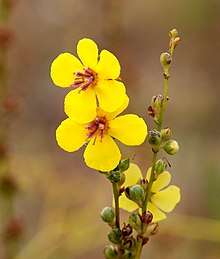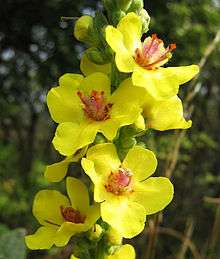Verbascum
Verbascum (/vɜːrˈbæskəm/[3]), common name mullein (sg. /ˈmʌlɪn/[4]), is a genus of about 360 species of flowering plants in the figwort family Scrophulariaceae. They are native to Europe and Asia, with the highest species diversity in the Mediterranean.[5][6]
| Verbascum | |
|---|---|
 | |
| Wavyleaf mullein, Verbascum sinuatum | |
| Scientific classification | |
| Kingdom: | Plantae |
| Clade: | Tracheophytes |
| Clade: | Angiosperms |
| Clade: | Eudicots |
| Clade: | Asterids |
| Order: | Lamiales |
| Family: | Scrophulariaceae |
| Tribe: | Scrophularieae |
| Genus: | Verbascum L. |
| Type species | |
| Verbascum thapsus [1] L. | |
| Synonyms[2] | |
| |
Mullein or "mullein leaf" often refers to the leaves of Verbascum thapsus, the great or common mullein, which is frequently used in herbal medicine.
Description
They are biennial or perennial plants, rarely annuals or subshrubs, growing to 0.5 to 3 metres (1.6 to 9.8 ft) tall. The plants first form a dense rosette of leaves at ground level, subsequently sending up a tall flowering stem. Biennial plants form the rosette the first year and the stem the following season. The leaves are spirally arranged, often densely hairy, though glabrous (hairless) in some species. The flowers have five symmetrical petals; petal colours in different species include yellow (most common), orange, red-brown, purple, blue, or white. The fruit is a capsule containing numerous minute seeds.
Cultivation

In gardening and landscaping, the mulleins are valued for their tall narrow stature and for flowering over a long period of time, even in dry soils. Many cultivars are available, of which 'Gainsborough',[7]'Letitia',[8] 'Pink Domino'[9] and ‘Tropic Sun’[10] have gained the Royal Horticultural Society's Award of Garden Merit.[11]
Since the year 2000, a number of new hybrid cultivars have come out that have increased flower size, shorter heights, and a tendency to be longer-lived plants. A number have new colors for this genus. Many mulleins are raised from seed, including both the short-lived perennial and biennial types.
Other uses
The plant has a long history of use as a herbal remedy.[12] Although this plant is a recent arrival to North America, Native Americans used the ground seeds of this plant as a paralytic fish poison due to their high levels of rotenone. Verbascum flowers have been used in traditional Austrian medicine internally (as tea) or externally (as ointment, tea, baths or compresses) for treatment of disorders of the respiratory tract, skin, veins, gastrointestinal tract, and the locomotor system.[13]
The plant's stem, when dried, can be used in the hand drill method of friction fire lighting.
Species
The following species are accepted by The Plant List:[14]
- Verbascum acaule (Bory & Chaub.) Kuntze
- Verbascum adeliae Heldr.
- Verbascum adenanthum Bornm.
- Verbascum adrianopolitanum Podp.
- Verbascum agrimoniifolium Huber-Morath
- Verbascum anisophyllum Murb.
- Verbascum arcturus L.
- Verbascum argenteum Ten.
- Verbascum austriacum Schott
- Verbascum baldaccii Degen
- Verbascum banaticum Schrad.
- Verbascum barnadesii Vahl
- Verbascum bithynicum Boiss.
- Verbascum blattaria L.
- Verbascum boerhavei L.
- Verbascum boissieri (Heldr. & Sart. ex Boiss.) Kuntze
- Verbascum botuliforme Murb.
- Verbascum brevipedicellatum (Engl.) Hub.-Mor.
- Verbascum bugulifolium Lam.
- Verbascum calycosum Hausskn. ex Murb.
- Verbascum × candelabrum Kar. & Kir.
- Verbascum chaixii Vill.
- Verbascum chinense (L.) Santapau
- Verbascum creticum (L.f.) Cav.
- Verbascum cylindrocarpum Griseb.
- Verbascum cylleneum (Boiss. & Heldr.) Kuntze
- Verbascum daenzeri (Fauché & Chaub.) Fenzl
- Verbascum davidoffii Murb.
- Verbascum decorum Velen.
- Verbascum delphicum Boiss. & Heldr.
- Verbascum densiflorum Bertol.
- Verbascum dentifolium Delile
- Verbascum dieckianum Borbás & Degen
- Verbascum dingleri Mattf. & Stef.
- Verbascum drymophiloides Gritzenko
- Verbascum durmitoreum Rohlena
- Verbascum × edirnense Dane & G.Yılmaz
- Verbascum epixanthinum Boiss. & Heldr.
- Verbascum eriophorum Godr.
- Verbascum eskisehirensis Karavel., Ocak & Ekici
- Verbascum euboicum Murb. & Rech.f.
- Verbascum flavidum (Boiss.) Freyn & Bornm.
- Verbascum × gabrielianae Hub.-Mor.
- Verbascum georgicum Benth.
- Verbascum glabratum Friv.
- Verbascum glandulosum Delile
- Verbascum gnaphalodes M.Bieb.
- Verbascum graecum Heldr. & Sart.
- Verbascum guicciardii Heldr.
- Verbascum halacsyanum Sint. & Bornm. ex Halácsy
- Verbascum haraldi-adnani Parolly & Eren
- Verbascum hervieri Degen
- Verbascum herzogii Bornm.
- Verbascum humile Janka
- Verbascum jankaeanum Pančić
- Verbascum laciniatum (Poir.) Kuntze
- Verbascum lagurus Fisch. & C.A.Mey.
- Verbascum lanatum Schrad.
- Verbascum lasianthum Boiss. ex Benth.
- Verbascum laxum Filar. & Jav.
- Verbascum leucophyllum Griseb.
- Verbascum lesnovoensis Micevski
- Verbascum levanticum I.K.Ferguson
- Verbascum litigiosum Samp.
- Verbascum longifolium Ten.
- Verbascum lychnitis L.
- Verbascum macedonicum Kosonin & Murb.
- Verbascum macrocarpum Boiss.
- Verbascum macrurum Ten.
- Verbascum mallophorum Boiss. & Heldr.
- Verbascum megricum Huber-Morath
- Verbascum mucronatum Lam.
- Verbascum nevadense Boiss.
- Verbascum nicolai Rohlena
- Verbascum nigrum L.
- Verbascum niveum Ten.
- Verbascum nobile Velen.
- Verbascum nudicaule Takht.
- Verbascum oreophilum C. Koch
- Verbascum orientale (L.) All.
- Verbascum orphanideum Murb.
- Verbascum ovalifolium Donn ex Sims
- Verbascum ozturkii Karavel., Uzunh. & S.Çelik
- Verbascum × patris Bordz.
- Verbascum pelium Halácsy
- Verbascum pentelicum Murb.
- Verbascum phlomoides L.
- Verbascum phoeniceum L.
- Verbascum pinnatifidum Vahl
- Verbascum pseudonobile Stoj. & Stef.
- Verbascum pterocaulon Nyman
- Verbascum pulverulentum Vill.
- Verbascum purpureum (Janka) Hub.-Mor.
- Verbascum pyramidatum M.Bieb.
- Verbascum reiseri Halácsy
- Verbascum roripifolium (Halácsy) I.K.Ferguson
- Verbascum rotundifolium Ten.
- Verbascum × rubiginosum Waldst. & Kit.
- Verbascum rupestre (Davidov) I.K.Ferguson
- Verbascum salgirensis Soldano
- Verbascum samniticum Ten.
- Verbascum schachdagense Gritzenko
- Verbascum siculum Tod. ex Lojac.
- Verbascum sinaiticum Benth.
- Verbascum sinuatum L.
- Verbascum songaricum Schrenk
- Verbascum speciosum Schrad.
- Verbascum spinosum L.
- Verbascum suworowianum Kuntze
- Verbascum szovitsianum Boiss.
- Verbascum thapsus L.
- Verbascum undulatum Lam.
- Verbascum vandasii (Rohlena) Rohlena
- Verbascum varians Freyn & Sint.
- Verbascum virgatum Stokes
- Verbascum xanthophoeniceum Griseb.
- Verbascum zuccarinii (Boiss.) I.K.Ferguson
See also
- Mullein moth, a species in the order Lepidoptera which feeds on Verbascum and other plants.
Notes
- Nathaniel Lord Britton; Addison Brown (1947). An Illustrated Flora of the Northern United States, Canada and the British Possessions from Newfoundland to the Parallel of the Southern Boundary of Virginia, and from the Atlantic Ocean Westward to the 102d Meridian. 3 (2nd ed.). New York Botanical Garden. p. 173.
- "USDA GRIN Taxonomy". Retrieved February 11, 2014.
- Sunset Western Garden Book, 1995:606–607
- "mullein". Oxford English Dictionary (3rd ed.). Oxford University Press. September 2005. (Subscription or UK public library membership required.)
- Sotoodeh, Arash (2018). "Focusing on three Verbascum L. taxa (Scrophulariaceae) of the Flora of Iran". Adansonia. 40 (13): 171. doi:10.5252/adansonia2018v40a13.
- Sotoodeh, Arash (2015). Histoire biogéographique et évolutive des genres Verbascum et Artemisia en Iran à l'aide de la phylogénie moléculaire. France: Université Toulouse III - Paul Sabatier.
- "RHS Plant Selector - Verbascum 'Gainsborough'". Retrieved 7 June 2013.
- "RHS Plant Selector - Verbascum 'Letitia'". Retrieved 7 June 2013.
- "RHS Plant Selector - Verbascum 'Pink Domino'". Retrieved 7 June 2013.
- "RHS Plantfinder - Verbascum 'Tropic Sun'". Retrieved 5 February 2019.
- "AGM Plants - Ornamental" (PDF). Royal Horticultural Society. July 2017. p. 106. Retrieved 5 February 2019.
- Tierra, Michael & John Lust (2003). The Natural Remedy Bible (revised and updated ed.). New York: Pocket Books. pp. 164, 180. ISBN 978-0-7434-6642-4.
- Vogl, S; Picker, P.; Mihaly-Bison, J.; Fakhrudin, N.; Atanasov, A. G.; Heiss, E. H.; Wawrosch, C.; Reznicek, G.; Dirsch, V. M.; Saukel, J.; Kopp, B. (2013). "Ethnopharmacological in vitro studies on Austria's folk medicine—an unexplored lore in vitro anti-inflammatory activities of 71 Austrian traditional herbal drugs". Journal of Ethnopharmacology. 149 (3): 750–71. doi:10.1016/j.jep.2013.06.007. PMC 3791396. PMID 23770053.
- "Verbascum". The Plant List. Retrieved 7 March 2017.
References
- Flora Europaea: Verbascum
- Flora of China: Verbascum
- Davis, P. H., Edmondson, J. R., Mill, R. R., & Parris, B. S., eds. (1978). Flora of Turkey and the East Aegean Islands 6: 461.
External links
| Wikimedia Commons has media related to Verbascum. |

- . The American Cyclopædia. 1879.
- "Mullein". New International Encyclopedia. 1905.
- . . 1914.
- "Mullein". Encyclopedia Americana. 1920.
- . Collier's New Encyclopedia. 1921.
- Verbascum.org